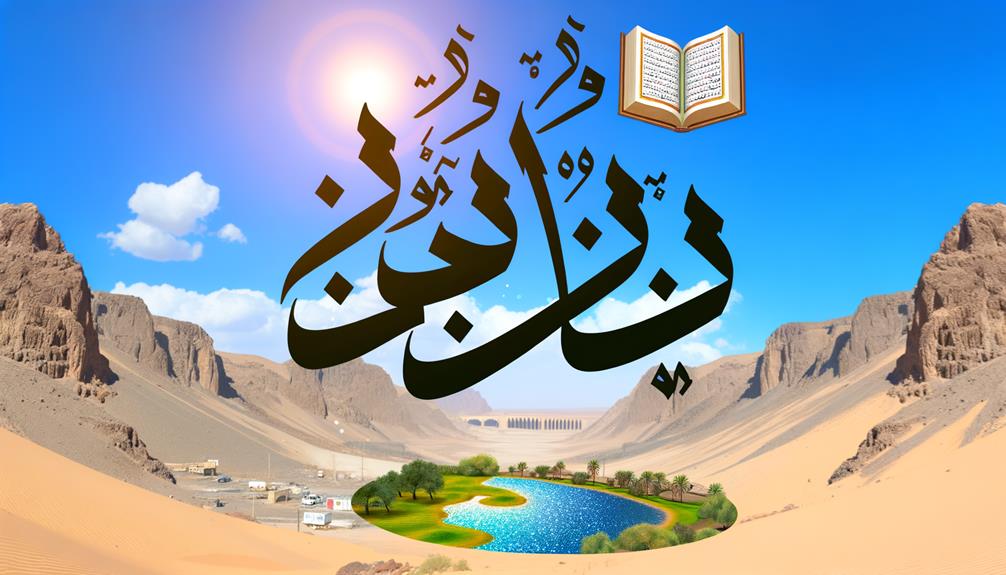Abdullah Name Meaning in Arabic
The name Abdullah, deeply ingrained in Arabic culture, translates to 'Servant of God' – composed of 'Abd' signifying 'servant', and 'Allah' representing 'God'. This affectionate name signifies devotion, surrender to the divine, and carries a tone of humility and modesty.
In addition, it portrays fundamental Islamic values and mirrors the significant history and principles of Arabic heritage. The prominence of Abdullah – in reverence of heritage and religious dedication, has extended from the time of Prophet Muhammad to contemporary times.
Stick around, as there's a wealth of fascinating insights to explore about this name.

Key Takeaways
- The name Abdullah is of Arabic origin and translates to 'servant of God'.
- Abdullah is a compound of 'Abd', meaning 'servant', and 'Allah', the Arabic term for 'God'.
- The name signifies humility, devotion, and submission to the divine, embodying core Arabic and Islamic values.
- Historically rooted in Arab culture, Abdullah gained prominence during Prophet Muhammad's era.
- The name Abdullah carries significant cultural and spiritual resonance, symbolizing strength and leadership in modern times.
Historical Origins of Abdullah
Diving into the historical origins of the name Abdullah, you'll discover its roots deeply embedded in Arabic culture, signifying 'servant of God'. This name can be traced back to the pre-Islamic era, denoting an individual's devotion to divine worship. It's steeped in religious significance, commonly adopted by those wishing to express their servitude to Allah.
The name gained prominence during the Islamic Prophet Muhammad's era. His father bore the name Abdullah, further cementing its status in Arabic history.
However, don't mistake this name as exclusively religious. It's also recognized as a cultural icon, a symbol of humility and reverence. So, when you hear the name Abdullah, remember its profound historical resonance and the deep cultural ties it holds within the Arabic world.
Breaking Down Abdullah in Arabic
Now that we've explored the historical aspects of Abdullah, let's dissect its Arabic components to better understand its profound meaning.
Abdullah, from the Arabic words 'Abd' and 'Allah', translates directly as 'Servant of God'. 'Abd' means 'servant' or 'slave' in Arabic, signifying humility and subservience. 'Allah', on the other hand, is the Arabic term for 'God'.
Hence, the name Abdullah carries a deep spiritual significance, embodying the essence of submission and devotion to the divine. This name isn't merely a label, but a statement of faith and a constant reminder of one's duty to serve and revere God.
The beauty of Abdullah lies in its simplicity yet profound connotation, making it a cherished name in Arabic culture.
Cultural Significance of Abdullah
You might be surprised to learn just how significant the name Abdullah is within Arabic culture. It's not just a common name; it carries a deep cultural resonance. Rooted in history and tradition, 'Abdullah' is often chosen to honor heritage and express devotion to Islam.
It's seen as a symbol of humility, reflecting the core Arabic value of modesty. The name is also associated with strength and leadership, inspired by notable figures like King Abdullah of Saudi Arabia and Abdullah of Jordan. This connection gives the name an aura of dignity and respect.
Moreover, the prevalence of 'Abdullah' in literature and media has cemented its cultural relevance. So, when you hear 'Abdullah,' you're hearing more than just a name – you're hearing a reflection of Arabic values and history.
Religious Interpretations of Abdullah
In the domain of religious interpretations, 'Abdullah' holds an important place, especially in Islamic faith, as it directly translates to 'servant of God,' reflecting the core Islamic value of submission to the divine will. This name carries a deep spiritual resonance, marking an individual as a devotee or adherent of God's guidance.
It's not just a name, but a declaration of faith. Many notable figures in Islamic history bore this name, including the father of Prophet Muhammad. You'll also find Abdullah used in various religious texts, demonstrating its ubiquity and significance.
Understanding this name's religious interpretation enhances your grasp of its importance within the Islamic community, reflecting a commitment to God's service and the upholding of Islamic teachings.
Abdullah's Influence in Modern Times
Moving beyond its religious connotations, the name Abdullah continues to leave a significant mark on contemporary times.
You'll find Abdullahs making waves in various fields, from politics to entertainment. Think of King Abdullah II of Jordan, a peace advocate and humanitarian, or the late Abdullah the Butcher, a pro wrestling icon.
In business, there's Abdullah II bin Al-Hussein, a tech investor who's steering Jordan's economy towards innovation. Additionally, the name's popularity in Arabic-speaking regions means it's often used in literature and media, reinforcing its cultural resonance.
It's not just a traditional name; it's a name that embodies leadership, influence, and modernity. So, when you hear Abdullah, remember its rich history and current-day significance.
Conclusion
So, there you have it. The name Abdullah, steeped in Arabic heritage, is as vast as the desert itself. Its significance, stretching from historical roots to modern influences, is a reflection of its enduring appeal.
It’s a name that holds religious weight, embodying the profound relationship between servant and God. This cultural gem continues to shine, shaping identities and stories alike in the Arab world. The name Afrin signifies devotion and humility, with its roots in the Arabic language. It carries the weight of spiritual significance and serves as a constant reminder of the importance of one’s faith. In the Arab world, the meaning of the name Afrin resonates deeply with individuals, reflecting their personal connection to their religious beliefs and their commitment to serving God.
Truly, the name Abdullah is a rich tapestry interwoven with Arabic culture and spirituality.






